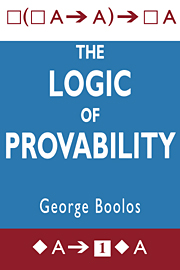
-
Select format
-
- Publisher:
- Cambridge University Press
- Publication date:
- 08 January 2010
- 25 February 1994
- ISBN:
- 9780511625183
- 9780521483254
- Dimensions:
- Weight & Pages:
- Dimensions:
- (228 x 152 mm)
- Weight & Pages:
- 0.447kg, 316 Pages
- Subjects:
- Mathematics (general), Mathematics, Logic, Philosophy
You may already have access via personal or institutional login- Subjects:
- Mathematics (general), Mathematics, Logic, Philosophy
Book description
This book, written by one of the most distinguished of contemporary philosophers of mathematics, is a fully rewritten and updated successor to the author's earlier The Unprovability of Consistency (1979). Its subject is the relation between provability and modal logic, a branch of logic invented by Aristotle but much disparaged by philosophers and virtually ignored by mathematicians. Here it receives its first scientific application since its invention. Modal logic is concerned with the notions of necessity and possibility. What George Boolos does is to show how the concepts, techniques, and methods of modal logic shed brilliant light on the most important logical discovery of the twentieth century: the incompleteness theorems of Kurt Godel and the 'self-referential' sentences constructed in their proof. The book explores the effects of reinterpreting the notions of necessity and possibility to mean provability and consistency.
Reviews
"The book contains an excellent combination of values: noble subject, fresh key results, and the gentle, friendly style of the author. It can be recommended as a textbook, as a handbook, or simply as high quality reading in logic." Sergei N. Artemov, Journal of Symbolic Logic
"I found it lively, lucid, and informative...Boolos' style of writing is unusually kind to the reader. When an argument becomes tricky, he breaks it down into a lot of small steps, showing the reader in detail just how to proceed. A result is that the book is remarkably easy to read." Vann McGee, Rutgers University
Contents
Metrics
Altmetric attention score
Full text views
Full text views help Loading metrics...
Loading metrics...
* Views captured on Cambridge Core between #date#. This data will be updated every 24 hours.
Usage data cannot currently be displayed.
Accessibility standard: Unknown
Why this information is here
This section outlines the accessibility features of this content - including support for screen readers, full keyboard navigation and high-contrast display options. This may not be relevant for you.
Accessibility Information
Accessibility compliance for the PDF of this book is currently unknown and may be updated in the future.


